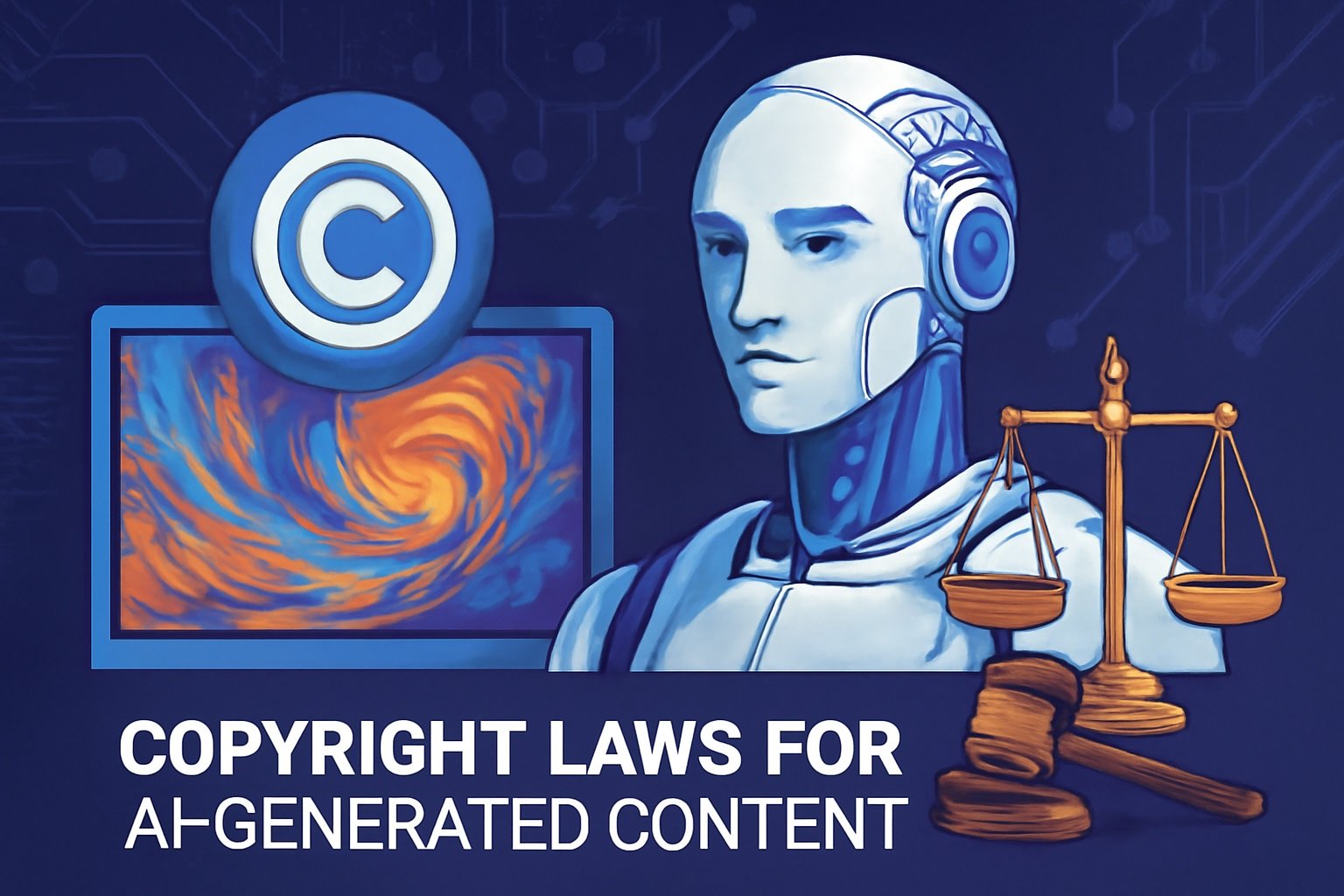Copyright Laws for AI-Generated Content
In the age of artificial intelligence (AI), content creation is no longer solely in the hands of human authors. AI has significantly transformed various industries, including writing, music, art, and even code generation. With this transformation comes a critical question: Who owns the rights to content generated by AI? Copyright laws, which have traditionally protected human creativity, now face a challenge in determining whether AI-generated works can be protected by copyright. This article explores the complexities of copyright laws for AI-generated content, helping you understand whether AI-generated works can be copyrighted, who owns the rights, and the legal implications surrounding this rapidly evolving field.
Introduction to Copyright Laws and AI-Generated Content
The internet age has brought about revolutionary advancements, including AI technologies that can generate content with little to no human involvement. From chatbots that write essays to AI systems that create art, the ability for AI to produce original work is rapidly expanding. However, this rise in automation has created legal challenges, particularly in the realm of copyright laws for AI-generated content.
Copyright laws are designed to protect original works of authorship, whether in the form of literature, music, or visual art. These laws grant the creator exclusive rights to reproduce, distribute, and perform their work. But when an AI generates content, the question arises: Can AI, which lacks human authorship, hold copyright?
This article aims to shed light on this evolving issue, examining the various legal complexities involved in AI and copyright laws and offering insights into the future of copyright protections for AI-generated works.
The Basics of Copyright Law
Before delving into AI-specific issues, it’s essential to understand the basics of copyright law.
What is Copyright?
Copyright is a form of protection provided by law to the creators of “original works of authorship.” This protection applies to a wide range of creative, intellectual, or artistic forms, including:
- Literary works (books, articles)
- Musical works (songs, compositions)
- Dramatic works (plays, screenplays)
- Artistic works (paintings, sculptures)
- Software (programming code)
Key Principles of Copyright Law
- Originality: A work must be original and show a minimum level of creativity to be protected by copyright.
- Fixation: A work must be fixed in a tangible medium, such as a written document, a recorded performance, or a digital file.
- Exclusive Rights: Copyright grants the creator exclusive rights to control the reproduction, distribution, and public performance of their work.
AI-Generated Content and Its Legal Complexities
AI is now capable of generating content across various mediums, including text, images, music, and video. But can AI-generated works be considered under copyright law?
What is AI-Generated Content?
AI-generated content refers to works created through the use of algorithms, machine learning models, or other AI technologies without direct human intervention. Examples of AI-generated content include:
- Written Articles: AI tools like GPT-3 can generate written content such as news articles, blog posts, and marketing copy.
- Music: AI systems can compose original music based on trained data sets.
- Visual Art: AI can create digital art, paintings, and even sculpture designs.
Legal Ambiguities Around AI and Copyright Ownership
One of the main challenges surrounding AI-generated content is determining ownership. Copyright law traditionally requires that an author be a human, leaving AI-produced works in a gray area.
- Is AI a copyright owner? Under current laws, an AI itself cannot be an author because it does not have legal personhood. Therefore, copyright cannot be directly attributed to the AI.
- Can a human claim copyright? If a human is involved in the creation process, such as programming the AI or providing specific instructions, they may be eligible to claim authorship rights. But if an AI operates autonomously, ownership is more complicated.
Ownership of AI-Generated Works
When it comes to AI-generated content, the crucial question is: Who owns the rights? The answer largely depends on the involvement of humans and the specifics of how the AI operates.
Who Owns Copyright in AI-Generated Content?
- Human Creator vs. AI System: If a human contributes significant creative input (such as inputting ideas or modifying the AI’s output), they may be able to claim ownership. In some cases, the AI developer may hold the rights to works generated by their algorithms.
- AI Developers, Users, and Trainers: AI systems are often trained by developers using vast amounts of data. The developer may be entitled to some rights over the generated works, but the level of their involvement determines the scope of their claim.
Case Law on AI Ownership
In the U.S., the Copyright Office has stated that works created solely by AI without human input are not eligible for copyright. However, the involvement of humans in the creative process might result in a human claiming ownership.
For example, Stephen Thaler’s case (Thaler v. United States) questioned whether an AI system could be considered the creator of an artwork, sparking debates about AI ownership.
Global Perspectives on AI and Copyright Law
Different countries have varying approaches to AI and copyright laws, with some offering more clarity than others.
United States Copyright Law
- AI-Generated Works: In the U.S., the Copyright Office has made it clear that works created by machines or AI without human authorship are not protected by copyright. However, if a human contributes significantly to the creation process, they may be able to claim authorship.
- Can You Copyright AI Art in the U.S.? Copyright protection for AI-generated art is still under debate. In many cases, if the AI system is not sufficiently directed by a human, copyright may not apply.
European Union’s Approach
- EU Regulations: The European Union has started exploring ways to harmonize copyright and artificial intelligence requirements, with efforts focused on clarifying how AI-generated content should be treated under existing copyright laws.
- The European Commission has proposed new rules that address AI innovation, but copyright remains a grey area in relation to works created by AI systems.
Other Countries
- Canada, Japan, and Australia also offer varying degrees of protection for AI-generated content, with some countries allowing human creators to claim rights if they provide substantial input into the AI’s process.
Challenges and Controversies
The AI and copyright laws landscape is filled with challenges and controversies. Some of the most pressing issues include:
Lack of Clarity in Copyright Law
There is currently no clear consensus on how to handle AI-generated works under copyright law. As AI continues to evolve, lawmakers face a challenge in keeping up with the rapid advancements in technology.
Ethical and Legal Concerns
There are concerns over AI’s potential to infringe on existing copyright by using copyrighted works for training purposes without proper permission. Some critics argue that AI’s ability to mimic human creativity could lead to massive copyright violations.
Impact on Creators and Artists
Artists and creators may feel threatened by AI systems that can replicate their work without their involvement. This raises the question of whether AI violates copyright law or whether the law needs to adapt to a new era of creativity.
Fair Use and AI-Generated Content
One of the most commonly asked questions in the context of AI and copyright laws is whether AI-generated content can fall under the doctrine of fair use.
What is Fair Use?
Fair use allows limited use of copyrighted material without the permission of the copyright holder under specific conditions. Common examples of fair use include:
- Criticism or commentary
- Research and education
- News reporting
Can AI-Generated Content Be Fair Use?
In some instances, AI-generated content could potentially be considered fair use. However, this largely depends on the extent to which the content is derived from existing works. If an AI system creates something truly original, it may avoid copyright infringement, but if it heavily borrows from existing copyrighted material, it could violate copyright laws.
The Future of Copyright Laws and AI-Generated Content
As AI technology continues to evolve, so must copyright law. The intersection of artificial intelligence and copyright laws presents a unique challenge that requires careful consideration and reform.
Potential Legal Solutions
- Clear Guidelines for AI-Generated Content: There is a growing need for clear legal frameworks that specify how AI-generated content should be treated under copyright law.
- AI-Specific Copyright Models: Future copyright law could include specific provisions for AI-generated works, perhaps establishing a new category for AI-authored content.
Conclusion
As AI continues to produce creative works across various fields, the question of can you copyright AI-generated content becomes increasingly important. While current copyright laws do not provide clear answers, there are significant legal, ethical, and technological challenges that need to be addressed.
For now, creators and developers working with AI should be aware of the complexities surrounding copyright and artificial intelligence registration. As laws continue to evolve, it will be essential to stay informed and ensure that AI-generated works are used responsibly and legally.
The future of AI and copyright laws is still being written, but it’s clear that there is a need for comprehensive reform to address the unique challenges posed by AI in the creative space.

AI writing strategist with hands-on NLP experience, Liam simplifies complex topics into bite-sized brilliance. Trusted by thousands for actionable, future-forward content you can rely on.

